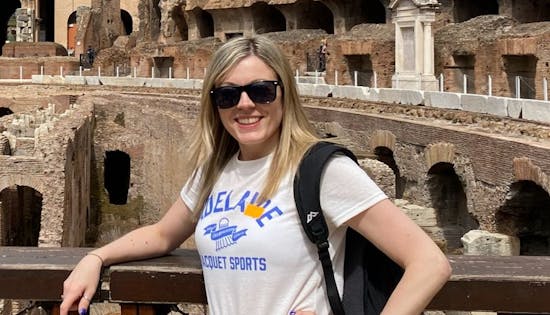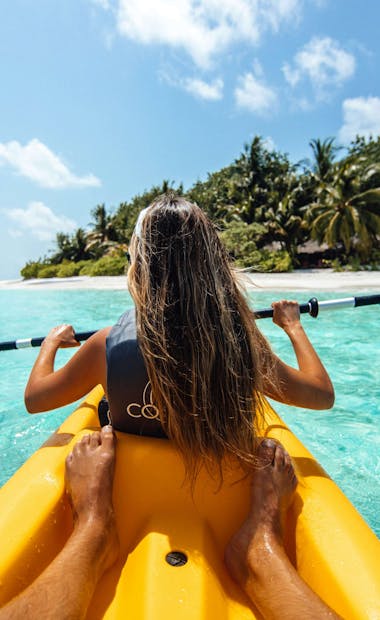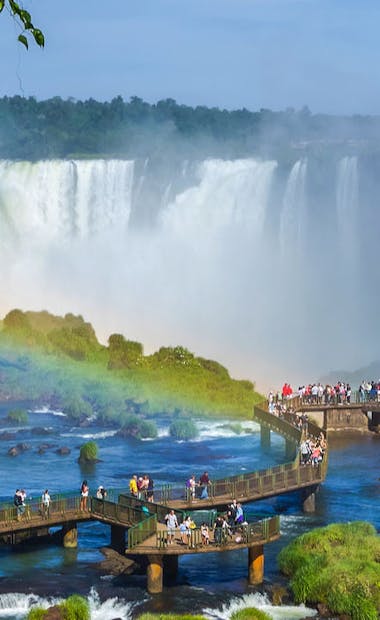
Brazil Tours
Sail down the Amazon or enjoy stunning beaches, lively music and incredible cuisine
Popular tours
- Save1%
 View Tour
View TourBest of Brazil - 8 Days
- Rio de Janeiro to Rio de Janeiro
- Age group: 15 - 99
- Max group size: 16
Was:£675From£668 - Save1%
 View Tour
View TourRio de Janeiro Carnival Experience - 6 Days
- Rio de Janeiro to Rio de Janeiro
- Age group: 12 - 100
- Max group size: 18
Was:£1,999From£1,979 - Save1%
 View Tour
View TourRio Carnival Experience - 6 Days
- Rio de Janeiro to Rio de Janeiro
- Age group: 15 - 99
- Max group size: 16
Was:£2,535From£2,510 - Save1%
 View Tour
View TourBrazil Experience - 9 Days
- Rio de Janeiro to São Paulo
- Age group: 18 - 39
- Max group size: 19
Was:£1,295From£1,282 - Save1%
 View Tour
View TourPure Brazil 2026 - 14 Days
- Salvador to Rio de Janeiro
- Age group: 16 - 79
- Max group size: 16
Was:£5,010From£4,960  View Tour
View TourManaus Amazon Express - 4 Days
- Manaus to Manaus
- Age group: 18 - 99
- Max group size: 12
From£600
Brazil Tours
Experience the Enchanting Wonders of Brazil on Unforgettable Brazil Tours and Holidays
Welcome to Brazil, a land of vibrant culture, breathtaking landscapes, and unparalleled diversity. Prepare to embark on a journey that will awaken your senses, ignite your spirit of adventure, and leave an indelible mark on your soul. With its bustling cities, pristine beaches, lush rainforests, and captivating traditions, Brazil offers an unparalleled tapestry of experiences waiting to be discovered.
Immerse yourself in the rhythm of samba and the infectious energy of Rio de Janeiro, home to the iconic Christ the Redeemer statue overlooking the city's picturesque beaches. Dance to the beats of the drums during the world-famous Carnival, an explosion of color, music, and joy that captivates millions. Stroll along the vibrant streets of Copacabana and Ipanema, savoring the tantalizing aromas of Brazilian street food and immersing yourself in the city's lively atmosphere.
Venture deep into the heart of the Amazon rainforest, a sprawling wilderness teeming with extraordinary biodiversity. Explore the winding waterways of the Amazon River, spotting exotic wildlife, vibrant birds, and lush vegetation at every turn. Engage with indigenous communities, learning about their rich cultural heritage and sustainable way of life. Feel the pulse of the jungle as you discover its hidden treasures and connect with nature in its purest form.
For nature enthusiasts, a visit to Iguazu Falls is an absolute must. Witness the awe-inspiring power and beauty of one of the world's most magnificent waterfalls. Marvel at the sheer volume of water cascading over the precipice, creating a breathtaking spectacle that will leave you spellbound. Walk along the network of trails, feeling the mist on your skin and absorbing the raw energy of this natural wonder.
Journey to the Pantanal, a vast wetland ecosystem, and immerse yourself in its abundant wildlife. Observe caimans basking in the sun, spot jaguars prowling through the dense vegetation, and witness flocks of colorful birds taking flight. The Pantanal offers a paradise for nature lovers and photographers, offering unique encounters with Brazil's incredible biodiversity.
No visit to Brazil would be complete without a trip to Salvador da Bahia, a city that exudes Afro-Brazilian culture and charm. Lose yourself in the winding streets of the historic Pelourinho district, adorned with colorful colonial buildings and vibrant street art. Experience the rich blend of African, European, and Indigenous influences through captivating music, dance, and cuisine.
Brazil is also home to some of the world's most stunning beaches, from the pristine shores of Fernando de Noronha to the golden sands of Florianopolis and the secluded tranquility of Jericoacoara. Whether you seek surfing, sunbathing, or simply unwinding amidst breathtaking natural beauty, Brazil's coastline offers a paradise for beach lovers.
From the wild expanse of the Amazon to the pulsating energy of Rio de Janeiro, Brazil beckons with its myriad of wonders. Let us be your guide to this captivating country, crafting unforgettable Brazil tours and holidays that capture the essence of its beauty, culture, and spirit. Our carefully curated itineraries and experienced guides will ensure that you experience the very best of Brazil, creating memories that will last a lifetime.
Book your Brazil tour or holiday today and embark on a journey of discovery. Let the vibrant colors, captivating rhythms, and warm hospitality of Brazil enchant you. Get ready to be swept away by the magic of this extraordinary destination.
When is the best time to visit Brazil?
The best time to visit Brazil depends on the specific regions you plan to explore and the experiences you seek. Brazil's vast size and diverse geography result in varying climates throughout the country. Here's a breakdown of the different seasons and considerations for timing your visit:
Summer (December to February): This is the peak summer season in Brazil, characterized by hot temperatures and vibrant festivities. It's an excellent time to visit coastal regions such as Rio de Janeiro, Sao Paulo, and Salvador. You can enjoy the famous Carnival in February, where the country comes alive with music, dance, and parades. However, popular destinations can be crowded during this time, so it's advisable to book accommodations and activities in advance.
Autumn (March to May) and Spring (September to November): These transitional seasons offer milder temperatures and fewer crowds, making them ideal for exploring various regions of Brazil. The Amazon rainforest experiences less rainfall during these periods, allowing for better wildlife spotting and outdoor activities. It's a good time to visit the Pantanal wetlands and enjoy outdoor adventures in destinations like Bonito and Iguazu Falls.
Winter (June to August): Brazil's winter is characterized by cooler temperatures, especially in the southern regions of the country. This is a great time to visit cities like Sao Paulo and Rio de Janeiro if you prefer milder weather and fewer tourists. The Pantanal experiences its dry season during this time, making it easier to spot wildlife. It's also an excellent time to explore the Amazon rainforest, as water levels recede, opening up more areas for exploration.
Rainy Season: Different regions of Brazil have varying rainy seasons. In the Amazon rainforest, the wettest months are usually from December to May, with heavy rainfall. If you're interested in visiting the rainforest, the shoulder months of the wet season (March to May) can be a good compromise, as the rain lessens but the forest remains lush. In contrast, the coastal areas, including Rio de Janeiro and Sao Paulo, experience more rain from November to March.
It's important to research the specific weather patterns and regional variations for your desired destinations within Brazil. Consider the activities you plan to undertake, such as hiking, wildlife spotting, or beach visits, as different seasons may offer distinct advantages for each.
Keep in mind that Brazil attracts visitors year-round, and the country's diverse attractions ensure that there's always something to see and do. Regardless of the time you choose to visit, Brazil promises a vibrant and captivating experience that will leave you with lasting memories.
Will I need a visa to travel to Brazil?
The visa requirements for traveling to Brazil vary depending on your nationality. It's important to check the specific visa regulations based on your country of citizenship before planning your trip. However, here is some general information about Brazilian visas:
Visa-Free Travel: Brazil has visa-free agreements with several countries, allowing their citizens to enter Brazil for tourism or business purposes without a visa for a specified period. For example, citizens of the United States, Canada, Australia, and most European countries can enter Brazil visa-free for up to 90 days. However, please note that these visa-free agreements are subject to change, so it's crucial to verify the current requirements before traveling.
Electronic Visa: Brazil introduced an electronic visa system for citizens of certain countries. This eVisa can be obtained online before your trip and allows for tourist or business travel to Brazil. The electronic visa is typically valid for up to 2 years, with a maximum stay of 90 days per visit. Some countries eligible for the electronic visa include the United States, Canada, Australia, and Japan.
Consular Visa: If your country is not eligible for visa-free travel or the electronic visa, you may need to apply for a consular visa at the Brazilian embassy or consulate in your home country. This process generally requires submitting an application, supporting documents, and paying the visa fee. The requirements and processing times can vary, so it's advisable to start the visa application process well in advance of your planned travel dates.
It's important to note that visa regulations can change, and it's always best to verify the most up-to-date information from official sources such as the Brazilian embassy or consulate in your country. They will provide the most accurate and specific information based on your nationality.
Remember that having a valid passport is a requirement for traveling to Brazil. Ensure that your passport is valid for at least six months beyond your intended departure date from Brazil.
By staying informed about the visa requirements and following the necessary procedures, you can ensure a smooth entry into Brazil and fully enjoy your trip to this captivating destination.
What are the must see destinations in Brazil?
Brazil is a vast and diverse country, offering an array of must-see destinations that cater to different interests and preferences. Here are some of the top highlights:
Rio de Janeiro: Known as the "Cidade Maravilhosa" (Marvelous City), Rio de Janeiro is famous for its stunning beaches, vibrant culture, and iconic landmarks. Visit the awe-inspiring Christ the Redeemer statue atop Corcovado Mountain, enjoy the lively atmosphere of Copacabana and Ipanema beaches, and explore the historic neighborhood of Santa Teresa.
Amazon Rainforest: Immerse yourself in the world's largest tropical rainforest, the Amazon. Take a boat trip along the Amazon River, spot exotic wildlife, explore indigenous communities, and experience the incredible biodiversity of this natural wonder.
Iguazu Falls: Located on the border between Brazil and Argentina, Iguazu Falls is a breathtaking spectacle of cascading waterfalls set amidst lush rainforest. Marvel at the sheer power and beauty of this UNESCO World Heritage site as you explore the trails and enjoy panoramic views.
Salvador da Bahia: Discover the cultural heart of Brazil in Salvador da Bahia, a city rich in Afro-Brazilian heritage. Explore the historic Pelourinho district, immerse yourself in vibrant music and dance forms like samba and capoeira, and savor the delicious local cuisine.
Pantanal: Embark on a wildlife adventure in the Pantanal, the world's largest tropical wetland area. Spot jaguars, caimans, giant otters, and an abundance of bird species as you explore this pristine ecosystem on guided tours and boat safaris.
Fernando de Noronha: Escape to the idyllic archipelago of Fernando de Noronha, a paradise for beach lovers and nature enthusiasts. Explore the crystal-clear waters, snorkel with sea turtles, and relax on pristine sandy beaches.
Sao Paulo: Experience the vibrant cosmopolitan energy of Sao Paulo, Brazil's largest city. Discover world-class museums, indulge in diverse culinary delights, and explore the eclectic neighborhoods that showcase the city's cultural diversity.
Ouro Preto: Step back in time in the charming colonial town of Ouro Preto. Wander through its cobblestone streets, admire the intricate baroque architecture, and visit the historic churches that are UNESCO World Heritage sites.
Florianopolis: Located on the southern coast, Florianopolis offers a perfect blend of natural beauty and lively beach culture. With over 40 stunning beaches, it's a paradise for surfers, sun-seekers, and nature lovers.
Chapada Diamantina: Explore the breathtaking landscapes of Chapada Diamantina National Park in Bahia. Hike through stunning canyons, discover hidden waterfalls, and marvel at the enchanting rock formations that make this region truly special.
These are just a few highlights of the countless incredible destinations Brazil has to offer. Each region has its own unique attractions and cultural experiences, ensuring that there's something for everyone to enjoy in this captivating country.
What is the local currency in Brazil, and can I use credit cards?
The local currency in Brazil is the Brazilian Real (BRL). It is advisable to have some Brazilian Reais on hand for small expenses and places that may not accept credit cards. You can exchange your currency for Brazilian Reais at banks, currency exchange offices, or ATMs (known as "caixas eletrônicos") found throughout the country.
Credit cards are widely accepted in most tourist areas, hotels, restaurants, and larger establishments in Brazil. International credit cards such as Visa, Mastercard, and American Express are commonly used. However, it's always a good idea to carry some cash for smaller establishments, street vendors, or in more remote areas where credit card acceptance may be limited.
It's important to notify your credit card company or bank about your travel plans to Brazil in advance. This will help ensure that your cards are authorized for use and to prevent any potential issues with card transactions being flagged as suspicious.
Additionally, be cautious when using credit cards to prevent fraud or theft. Use ATMs located within secure areas or banks, and avoid using your card in suspicious or unsecured locations. Keep your card in sight during transactions and regularly check your card statements for any unauthorized charges.
For convenience, it's recommended to have a mix of payment options while traveling in Brazil - a combination of cash (in local currency) and credit cards. This allows you to have flexibility in different situations and ensures you're prepared to make payments wherever you go.
Is Brazil a good destination for solo travellers?
Yes, Brazil can be a fantastic destination for solo travelers. With its diverse landscapes, vibrant culture, and friendly locals, Brazil offers a wealth of experiences for solo adventurers. Here are a few reasons why Brazil is a great choice for solo travelers:
Warm and Welcoming Locals: Brazilians are known for their warmth, hospitality, and friendliness. As a solo traveler, you'll likely find locals eager to engage in conversations, offer assistance, and share their culture with you. This can create meaningful connections and enhance your overall experience in the country.
Rich Cultural Experiences: Brazil's cultural diversity is a treasure trove for solo travelers. From the rhythms of samba in Rio de Janeiro to the Afro-Brazilian heritage in Salvador da Bahia, you can immerse yourself in a range of vibrant traditions and festivals. Engaging with the local culture, trying traditional cuisine, and participating in local activities can provide enriching and authentic experiences.
Natural Beauty and Outdoor Adventures: Brazil is blessed with stunning natural landscapes, making it an ideal destination for outdoor enthusiasts. Whether you're exploring the Amazon rainforest, hiking in the Chapada Diamantina, or relaxing on pristine beaches, there are plenty of opportunities for solo adventures. You can embark on guided tours, join group activities, or simply venture out on your own, enjoying the beauty of Brazil's diverse ecosystems.
Safety Considerations: While it's important to exercise caution and be aware of your surroundings as a solo traveler in any destination, many areas of Brazil are generally safe for tourists. Popular tourist spots and cities like Rio de Janeiro and Sao Paulo have well-developed tourism infrastructure and offer safety measures to ensure visitors' well-being. However, it's advisable to research your destinations, follow local advice, and take common-sense precautions to stay safe.
Solo-Friendly Accommodation and Activities: Brazil caters to solo travelers with a wide range of accommodation options. Hostels, guesthouses, and boutique hotels often provide opportunities to meet fellow travelers and join group activities. Many tour operators offer group tours and activities suitable for solo travelers, allowing you to connect with like-minded individuals and share memorable experiences.
As with any solo travel experience, it's important to plan ahead, stay informed, and trust your instincts. Research your destinations, understand the local customs and etiquette, and take necessary precautions to ensure a safe and enjoyable trip. By embracing the spirit of adventure and openness, solo travelers can create unforgettable memories and discover the beauty and wonders of Brazil.
Is Brazil a safe destination?
Brazil is generally a safe destination for travelers, but like any other country, it is important to exercise caution and be aware of your surroundings. While Brazil has many safe and popular tourist destinations, there are certain areas and cities where crime rates may be higher. Here are some safety considerations for traveling in Brazil:
Research Your Destinations: Before visiting Brazil, it is advisable to research the specific regions and cities you plan to visit. Some areas, particularly in major cities like Rio de Janeiro and Sao Paulo, may have higher crime rates. However, by staying in well-known tourist areas, using reputable transportation options, and following local advice, you can minimize potential risks.
Stay Alert and Avoid Flashy Displays of Wealth: Keep a close eye on your belongings and be cautious in crowded places, as petty theft and pickpocketing can occur, especially in tourist areas. Avoid wearing expensive jewelry or displaying large amounts of cash, as it may attract unwanted attention.
Use Reliable Transportation: Utilize official taxis, ride-sharing apps, or prearranged transportation services rather than hailing taxis from the street. This helps ensure your safety and minimizes the risk of falling victim to scams or unlicensed drivers.
Secure Accommodations: Choose reputable accommodations with good security measures, such as hotels or guesthouses in well-traveled areas. Lock your room and use safety deposit boxes for valuable items.
Be Cautious at Night: Exercise caution when moving around at night, especially in unfamiliar or poorly lit areas. It's advisable to travel with a companion, take licensed taxis, or use ride-sharing services to ensure a safer journey.
Stay Informed and Follow Local Advice: Stay updated on the current local news and follow any travel advisories issued by your embassy or consulate. Local authorities and tourism offices can provide valuable advice on safety measures and areas to avoid.
Language and Cultural Awareness: Learning a few basic phrases in Portuguese and respecting local customs and cultural norms can go a long way in ensuring a positive and safe experience in Brazil.
By being prepared, informed, and using common sense, you can enjoy a safe and memorable trip to Brazil. It's important to remember that while certain areas may have safety concerns, millions of tourists visit Brazil each year without incident. Embrace the spirit of adventure, take necessary precautions, and focus on exploring the incredible beauty and culture that Brazil has to offer.
Will I require any vaccinations to travel to Brazil?
Yes, it is recommended to have certain vaccinations before traveling to Brazil to ensure your health and safety. The specific vaccinations you need may vary depending on factors such as your age, overall health, and the areas you plan to visit within Brazil. Here are some vaccinations that are commonly recommended for travelers to Brazil:
Routine Vaccinations: Ensure that your routine vaccinations are up to date, including vaccines for diseases like measles, mumps, rubella, diphtheria, pertussis, tetanus, and varicella (chickenpox).
Hepatitis A: Hepatitis A is a viral infection transmitted through contaminated food and water. It is recommended for all travelers to Brazil, as the risk of exposure can be present, particularly in areas with poor sanitation or inadequate hygiene practices.
Typhoid Fever: Typhoid fever is another bacterial infection transmitted through contaminated food and water. It is recommended for travelers who will have prolonged stays in Brazil or who plan to visit rural or remote areas where the risk of exposure may be higher.
Yellow Fever: Yellow fever is a viral disease transmitted by mosquitoes, and it is endemic in certain areas of Brazil. The Brazilian government requires proof of yellow fever vaccination for travelers visiting or coming from countries with a risk of yellow fever transmission. Additionally, even if not required, it is strongly recommended to get the yellow fever vaccine if you plan to visit areas where the virus is present.
Measles, Mumps, Rubella (MMR): Make sure you are vaccinated against measles, mumps, and rubella. Outbreaks of these diseases still occur in various parts of the world, including Brazil.
Other Vaccinations: Depending on the duration and nature of your trip, as well as any specific activities or destinations you plan to engage in, additional vaccinations may be recommended. These can include vaccines for diseases such as hepatitis B, rabies, meningitis, and influenza. It's best to consult with a healthcare professional or travel medicine specialist to assess your individual needs and discuss the appropriate vaccinations for your trip.
It is important to schedule a visit with your healthcare provider or a travel medicine specialist well in advance of your trip to allow enough time for vaccinations to take effect and for any necessary booster doses. They will be able to provide you with the most up-to-date information and recommendations based on your specific travel plans and medical history.
Remember that in addition to vaccinations, it's also important to take other preventive measures to protect your health while traveling, such as practicing good hygiene, using mosquito repellent, and taking precautions to prevent food and waterborne illnesses.
What is the food like in Brazil?
Brazilian cuisine is diverse, flavorful, and influenced by a combination of indigenous, African, Portuguese, and immigrant cultures. The country's vast size and regional variations contribute to a wide range of culinary delights. Here's a glimpse into the delicious world of Brazilian food:
Feijoada: Considered Brazil's national dish, feijoada is a hearty and flavorful black bean stew traditionally made with various cuts of pork, such as sausages, bacon, and ribs. It is typically served with rice, collard greens, farofa (toasted cassava flour), and orange slices.
Churrasco: Brazilian barbecue, known as churrasco, is a carnivorous feast. Grilled meats, including beef, pork, chicken, and sausages, are seasoned and cooked on large skewers over an open flame. This style of dining often includes an "all-you-can-eat" arrangement with a variety of cuts and accompaniments.
Pão de Queijo: These delightful cheese bread balls are a popular snack in Brazil. Made from cassava flour, they have a crispy outer layer and a soft, cheesy center. Pão de queijo is enjoyed throughout the day, either as a snack or as part of a breakfast spread.
Acarajé: Hailing from the northeastern state of Bahia, acarajé is a beloved street food. It consists of deep-fried balls of black-eyed pea dough filled with a flavorful mixture of shrimp, vatapá (a spicy paste made from shrimp, coconut milk, and bread), and caruru (a sauce made from okra, onions, and dendê oil). It's a delicious taste of Afro-Brazilian cuisine.
Moqueca: Moqueca is a traditional Brazilian fish stew cooked with tomatoes, onions, garlic, and cilantro, and often flavored with coconut milk and dendê oil (palm oil). It is typically served with rice and farofa. The moqueca variations differ between regions, with a famous one coming from the state of Espírito Santo and another from Bahia.
Brigadeiro: This beloved Brazilian sweet treat is a chocolate truffle made from condensed milk, cocoa powder, butter, and chocolate sprinkles. Brigadeiros are rolled into small balls and are a staple at birthday parties and special occasions. They are rich, indulgent, and utterly delightful.
Açaí Bowl: Originating from the Amazon rainforest, açaí bowls have gained popularity worldwide as a healthy and refreshing snack. Açaí berries are blended into a thick, purple smoothie-like consistency and topped with granola, sliced fruits, and honey. They are perfect for a tropical energy boost.
Caipirinha: Brazil's national cocktail, the caipirinha, is made with cachaça (a sugarcane spirit), lime, sugar, and ice. It's a refreshing and tangy drink that perfectly complements Brazil's vibrant atmosphere.
Brazil offers a rich tapestry of flavors, with each region boasting its own specialties and culinary traditions. Whether you're enjoying street food, dining in a traditional churrascaria, or savoring regional delicacies, Brazilian cuisine is sure to tantalize your taste buds and leave you craving more.
Can I drink the tap water in Brazil?
It is generally not recommended to drink tap water in Brazil. While some major cities and tourist destinations have treated water that is considered safe for locals to drink, the quality of tap water can vary across different regions of the country. It's better to err on the side of caution to avoid potential gastrointestinal issues or waterborne illnesses.
To ensure safe drinking water during your trip to Brazil, you have a few options:
Bottled Water: The most convenient and widely available option is to purchase bottled water from reputable brands. Look for sealed bottles and check the expiration dates to ensure freshness.
Boiled or Filtered Water: If you prefer to minimize plastic waste or are in a situation where bottled water is not readily available, you can boil tap water for at least one minute to kill bacteria and other microorganisms. Alternatively, you can use water purification filters or tablets to make tap water safe for drinking. These methods help remove or kill potential contaminants.
Safe Water Sources: In some areas, there may be designated safe water sources, such as public water fountains or filtered water dispensers. These sources are specifically designed to provide safe drinking water and can be identified by signage or information from local authorities.
Drinks and Beverages: If you're unsure about the water quality, opt for sealed beverages, such as canned or bottled drinks, or drinks prepared with boiled water, like hot coffee or tea.
It's also important to remember that water is not the only potential source of contamination. Be cautious when consuming raw fruits and vegetables that may have been washed with tap water, and avoid adding ice to your drinks unless you're confident it was made from safe water sources.
By taking these precautions and staying vigilant about the quality of water you consume, you can help ensure a safe and healthy trip to Brazil.
Are there any cultural norms in Brazil I should follow?
Yes, Brazil has its own set of cultural norms and customs that visitors should be aware of to show respect and navigate social situations smoothly. Here are some important cultural norms to keep in mind when traveling in Brazil:Greetings and Personal Space: Brazilians are generally warm and friendly people. It is common to greet others with a handshake, a kiss on the cheek (for women and close acquaintances), or a simple "Oi" (hello) or "Bom dia" (good morning) in more informal settings. Brazilians tend to stand closer when conversing, so expect a closer personal space compared to some other cultures.
Punctuality: While punctuality is appreciated in formal settings, such as business meetings or appointments, it's not uncommon for social gatherings or informal events to start a bit later than the designated time. It is generally acceptable to arrive a few minutes late for casual social occasions.
Dress Code: Brazil's dress code varies depending on the region and the occasion. In beach towns and coastal areas, casual and beachwear are acceptable. In urban areas and more formal settings, it is customary to dress neatly and conservatively. When visiting religious sites or attending religious events, modest attire is appreciated.
Personal Affection: Brazilians are generally affectionate and expressive. It is common to see people hugging, touching arms, or holding hands while conversing. Physical contact is often used to convey warmth and friendliness.
Respect for Elders: Respect for elders is deeply ingrained in Brazilian culture. It is customary to address older individuals with titles such as "senhor" (sir) or "senhora" (madam). Politeness and deference towards older people are valued.
Tipping: Tipping, known as "gorjeta" in Portuguese, is common in Brazil. In restaurants, it is customary to add a 10% service charge to the bill, but it is also common to leave an additional tip for good service. In bars, hotels, and for services like taxis or tour guides, it is customary to leave a small tip as well.
Cultural Diversity: Brazil is a diverse country with various ethnic and cultural backgrounds. Embrace and respect this diversity, appreciating the different customs, traditions, and languages that you encounter.
Portuguese Language: Although English may be spoken in tourist areas and some major cities, it is always appreciated when visitors make an effort to learn a few basic Portuguese phrases. Locals will often be delighted to help and communicate with you, even if your Portuguese skills are limited.
By observing and respecting these cultural norms, you can foster positive interactions with locals and immerse yourself more deeply in the vibrant culture of Brazil. Remember, Brazilians are generally friendly and forgiving toward cultural differences, so embracing their customs with an open mind will enhance your travel experience.
What should I pack for a trip to Brazil?
When packing for a trip to Brazil, it's important to consider the diverse climate and activities you plan to engage in. Here's a list of essential items to pack:
Lightweight and Breathable Clothing: Brazil's climate varies across regions, but in general, lightweight and breathable clothing is recommended due to the country's tropical and humid weather. Pack T-shirts, shorts, skirts, dresses, and lightweight pants or leggings. Opt for natural fabrics like cotton or linen that allow airflow and help you stay cool.
Swimwear: Brazil is famous for its beautiful beaches, so don't forget to pack your swimsuit or trunks. Whether you plan to relax on the sands of Rio de Janeiro or explore the pristine beaches of Florianopolis, swimwear is a must.
Sun Protection: The Brazilian sun can be intense, so pack sun protection essentials. Bring a wide-brimmed hat, sunglasses with UV protection, and a high SPF sunscreen. Consider packing a lightweight cover-up or sarong for added sun protection.
Comfortable Walking Shoes: Brazil offers plenty of opportunities for exploration and sightseeing. Pack comfortable walking shoes or sneakers for walking tours, hikes, and exploring the vibrant cities.
Light Jacket or Sweater: Although Brazil is known for its warm climate, some regions, especially in the south or higher altitudes, can experience cooler evenings or seasons. Pack a light jacket or sweater for cooler temperatures or air-conditioned environments.
Rain Gear: Depending on the region and the time of year, Brazil can experience occasional rain showers. Pack a compact and lightweight rain jacket or umbrella to stay dry during unexpected downpours.
Insect Repellent: Protect yourself from mosquito bites, especially in tropical areas or during the rainy season. Pack a reliable insect repellent to ward off mosquitoes and other insects.
Travel Adapter: Brazil uses a Type N electrical outlet with a voltage of 220V. Be sure to pack a suitable travel adapter if your electronic devices require one.
Medications and First Aid Kit: If you have any prescription medications, be sure to pack an adequate supply for the duration of your trip. Consider bringing a basic first aid kit with essentials like band-aids, pain relievers, and any personal medications you may need.
Travel Documents: Don't forget to pack your passport, travel insurance, flight tickets, and any other necessary travel documents. It's a good idea to keep electronic or paper copies of these documents as well.
Money and Payment Options: Bring some Brazilian currency (Real) for immediate expenses, as not all places may accept credit cards or foreign currencies. Additionally, bring a debit or credit card that can be used internationally for convenience.
Travel Guide or Maps: While you can access information digitally, having a travel guidebook or printed maps can be helpful for planning and navigating your way around Brazil, especially in areas with limited internet connectivity.
Remember to pack according to the specific season, region, and activities you plan to engage in during your trip to Brazil. Checking the weather forecast for your destination will also help you pack accordingly.
How does the rooming work on tours?
Small group tours in Brazil typically involve a set itinerary where you travel with a group of fellow travellers and a tour leader/guide. Accommodation arrangements vary depending on the specific tour you choose. Here are some common aspects of rooming arrangements on small group tours:
Shared Rooms: In order to promote camaraderie and facilitate interaction among group members, most tours arrange shared accommodation. This means you will be paired with another member of the same gender from the group to share a room. Roommates may sometimes change periodically throughout the tour.
Single Supplement: If you prefer to have your own room and privacy, you may have the option to pay a single supplement fee. This additional fee allows you to have your own room for the duration of the tour. However, please note that single supplements can vary in cost and availability.
Roommate Matching: Tour operators usually offer roommate matching services, where they try to pair you with a suitable roommate based on your preferences, such as age range. This can help ensure compatibility and a more enjoyable experience for all participants.
Rooming Preferences: When booking your small group tour, it's important to communicate your rooming preferences to the tour operator. If you have specific requirements or preferences, such as sharing with a friend or a specific roommate request, it's advisable to inform the tour operator during the booking process.
It's important to carefully read the tour details and inclusions provided by the tour operator to understand their specific rooming policies. If having your own room is a priority, make sure to inquire about the availability of single supplements and any associated costs before booking your tour.
Keep in mind that while sharing a room with a fellow traveller can be a great way to meet new people and build connections, having your own room provides more privacy and flexibility. Consider your preferences and the dynamics of the tour when deciding whether to opt for a shared room or pay for a single supplement.
Remember to communicate your needs and preferences clearly with the tour operator during the booking process to ensure a comfortable and enjoyable accommodation experience on your small group tour in Brazil.
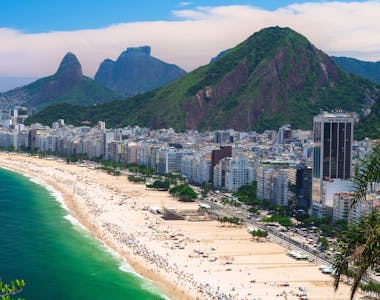
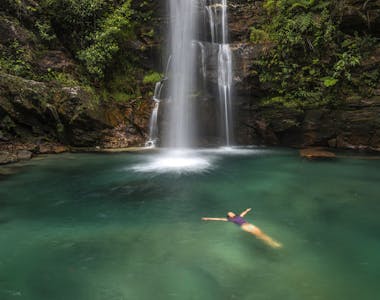


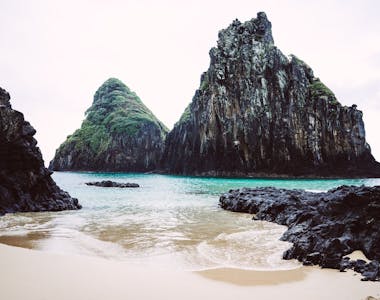
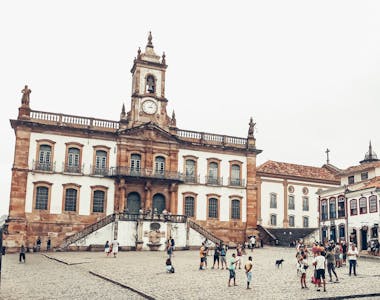
Book With Confidence
Monthly Payments
Spread the costs with no interest or additional fees
Best Price Guarantee
We won't be beaten on price. If you find this adventure at a lower price please get in touch!
Reserve now & pay later
Reserve your adventure today and pay later, free of charge
ATOL protected
Book with confidence
Hold your space today, for free
or book your trip with a deposit and then pay the rest in instalments.
Reserve your flights with us
Add flights to your booking and we'll take care of the rest. You'll get 24/7 support from our team & ATOL protection.
Speak to our experts
Call or email our expert team to find out more and help with ideas and planning.
